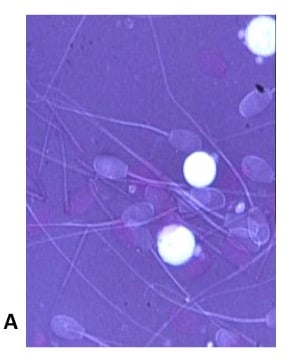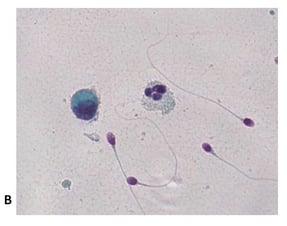
 One of the first steps in fertility testing for any male infertility issues is a semen analysis. A semen analysis gives a good representation of the male’s quantity and quality of sperm, as shown in this sample semen analysis. Sometimes even debris and cells can be found in the sample. Debris, such as epithelial cells, is commonly found in small quantities, as well as, white blood cells. White blood cells in semen is not an issue, unless there is the presence of more than 1 million white blood cells per milliliter of semen.
One of the first steps in fertility testing for any male infertility issues is a semen analysis. A semen analysis gives a good representation of the male’s quantity and quality of sperm, as shown in this sample semen analysis. Sometimes even debris and cells can be found in the sample. Debris, such as epithelial cells, is commonly found in small quantities, as well as, white blood cells. White blood cells in semen is not an issue, unless there is the presence of more than 1 million white blood cells per milliliter of semen.
White blood cells are an essential part of the immune system. They fight off invading bacteria and infections. They are produced in our bone marrow and move throughout the bloodstream. When an area becomes infected, WBC count increases and begins attacking this area in aims of resuming the body’s health.
When white blood cells are detected in a semen analysis it raises concern because it may indicate a genital tract infection. If it is not treated, there can be damage to the testis. Additional damage can be caused by the white blood cells because they produce superoxide radicals, which damage the sperm, along with its DNA. This damage can also affect the sperms ability to fertilize an oocyte.
 How do white blood cells look compared to other cells?
How do white blood cells look compared to other cells?Often there is confusion between white blood cells, sperm precursor cells, and insignificant round cells due to their similar appearance. Therefore, there needs to be a clear distinction between white blood cells and sperm precursor cells. Below in photograph A is a mixture of white blood cells and sperm. They look round and white and tend to have a glowing appearance under the microscope:
Now looking at photograph B you can tell the difference between the insignificant cell on the left and the white blood cell on the right:
 Treatment typically involves the use of antibiotics and any non-steroidal anti-inflammatory medications. Often time’s doxycycline or ciprofloxacin can be prescribed by your physician. Treating with an antibiotic is recommended especially when the presence of WBC's is accompanied by decreased motility.
Treatment typically involves the use of antibiotics and any non-steroidal anti-inflammatory medications. Often time’s doxycycline or ciprofloxacin can be prescribed by your physician. Treating with an antibiotic is recommended especially when the presence of WBC's is accompanied by decreased motility.
DayPro 1,200 mg daily orally for two weeks along with food can be used if inflammation is suspected.
Also, antioxidants like coenzyme Q10, glutathione, vitamin E and C can help protect sperm from white blood cells' superoxide radicals.
There are other things men can do on their own to try to eliminate or reduce the amount of white blood cells:
A competent andrology laboratory can reliably distinguish between white blood cells and other insignificant cells.
To see a fertility specialist that offers a complete range of andrology services, schedule an appointment at one of InVia's four Chicago area fertility clinics.

Entire Website © 2003 - 2020
Karande and Associates d/b/a InVia
Fertility Specialists
